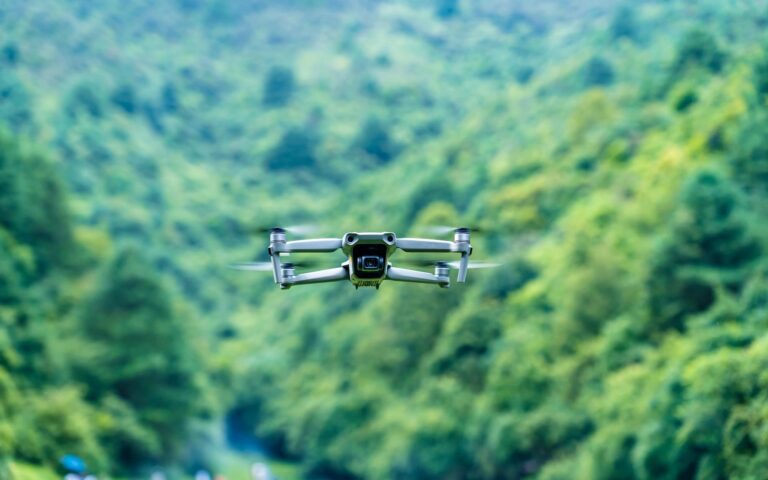Enhancing Crop Health and Resource Management: The Role of Drones in Modern Agriculture
In the rapidly evolving landscape of modern agriculture, drones have emerged as a game-changing tool, offering unparalleled precision and efficiency in crop management and resource conservation. At Precision Drone LLC, we harness the power of advanced aerial technology to provide agricultural drone services that elevate farming practices to new heights. By delivering precise monitoring and targeted applications, our services not only optimize crop health but also enhance resource management, contributing to sustainable agricultural practices. Our commitment to supporting Michigan’s farming and environmental sectors is evident through our innovative solutions that ensure both productivity and ecological balance. As we delve into the transformative role of drones, discover how these flying marvels are set to redefine the future of agriculture with unparalleled accuracy and care.
Revolutionizing Agriculture with Drones
Drones are transforming agriculture by offering new levels of precision and efficiency. These innovations allow farmers to monitor crops, apply resources selectively, and conduct comprehensive surveys. This not only improves productivity but also supports sustainable practices.
Precision in Crop Monitoring
Precision in crop monitoring is a significant advantage of using drones in agriculture. Drones equipped with advanced sensors and cameras can capture high-resolution images of fields. This data provides farmers with detailed insights into crop health and growth patterns.
-
Data Collection: Drones fly over fields collecting data that highlights variations in crop conditions.
-
Analysis: This data is then processed to identify areas needing attention, such as those with nutrient deficiencies.
-
Action: Farmers can make informed decisions, such as where to apply fertilizers or water, based on the analysis.
Drones provide a precise overview of the field, enabling targeted interventions. This accuracy helps optimize the use of inputs, ultimately leading to healthier crops and higher yields.
Targeted Application Techniques
Drones also enable targeted application techniques. Instead of treating an entire field uniformly, drones can apply resources like fertilizers or pesticides precisely where needed.
-
Reduction of Waste: Such targeted applications reduce waste, ensuring resources are used efficiently.
-
Environmental Benefits: Applying chemicals only where necessary minimizes environmental impact and promotes sustainability.
Drones’ precision targeting helps in adhering to sustainable farming practices by reducing chemical usage and ensuring crops receive the right amount of treatment.
Comprehensive Surveying Solutions
Drones offer comprehensive surveying solutions that enhance land management. With their ability to cover large areas quickly, drones can map fields, track changes over time, and provide valuable insights into land use patterns.
-
Mapping Capabilities: High-resolution maps help in planning crop rotations and understanding land topography.
-
Change Detection: Regular drone surveys can identify changes in land conditions or crop health, allowing for timely interventions.
This ability to monitor and map fields precisely is crucial for effective farm management, helping to maximize productivity and sustainability.
Optimizing Resource Management
Resource management is critical for sustainable farming. Drones contribute significantly by optimizing water usage, monitoring soil health, and managing natural resources effectively, leading to conservation and improved yields.
Efficient Water Usage
Efficient water usage is a major concern in agriculture. Drones can help address this issue by providing detailed insights into water distribution across fields.
-
Water Stress Detection: Drones can identify areas experiencing drought stress, allowing for targeted irrigation.
-
Optimized Irrigation: With precise data, farmers can optimize irrigation schedules, ensuring water is used where it is most needed.
By using drones, farmers can manage water resources better, conserving water and reducing costs associated with over-irrigation.
Soil Health and Management
Monitoring soil health and management is essential for long-term agricultural success. Drones play a pivotal role in assessing soil conditions and guiding management practices.
-
Soil Mapping: Drones can create detailed maps illustrating soil composition and moisture levels.
-
Guided Interventions: Based on this data, farmers can apply soil amendments or adjust planting strategies.
These capabilities help maintain soil fertility and structure, promoting robust crop growth and sustainable farming practices.
Managing Natural Resources
Drones also assist in managing natural resources. They provide data that supports the sustainable use of land, water, and biodiversity.
-
Resource Allocation: With accurate data, farmers can allocate resources judiciously, avoiding over-exploitation.
-
Environmental Conservation: By monitoring habitats, drones assist in protecting biodiversity and enhancing ecological balance.
These practices are vital for maintaining a balance between productive agriculture and environmental conservation.
Enhancing Crop Health
Enhancing crop health is a primary goal for any farmer. Drones facilitate this by enabling early disease detection, innovative pest control, and strategic nutrient management, all of which contribute to healthier crops.
Early Disease Detection
Early disease detection is crucial for preventing yield loss. Drones equipped with specialized sensors can identify disease symptoms before they become visible to the naked eye.
-
Rapid Identification: Quick detection allows for prompt action, reducing the spread of diseases.
-
Targeted Treatment: Farmers can apply treatments precisely where needed, improving efficacy.
This proactive approach helps preserve crop health and prevent significant losses, contributing to a more reliable food supply.
Pest Control Innovations
Drones offer pest control innovations by providing real-time data on pest populations and activity.
-
Monitoring: Drones can monitor pest-infested areas, providing data to guide interventions.
-
Precision Spraying: Equipped with pesticide dispensers, drones can apply treatments directly on hotspots, minimizing chemical use.
By integrating drones into pest management strategies, farmers can control infestations more effectively while reducing environmental impact.
Nutrient Management Strategies
Effective nutrient management strategies are essential for optimal crop growth. Drones support this by offering detailed insights into nutrient distributions across fields.
-
Nutrient Mapping: Drones can pinpoint nutrient deficiencies, allowing for targeted fertilization.
-
Resource Optimization: Farmers can apply nutrients precisely where needed, maximizing their impact.
These strategies help ensure crops receive the necessary nutrients for healthy growth, enhancing both yield and quality.
Agricultural Drone Service Benefits
Agricultural drone services offer numerous benefits, from cost-effectiveness to promoting sustainable farming practices and increasing yield and productivity. These advantages make drones an invaluable tool in modern agriculture.
Cost-Effectiveness and Pricing
The cost-effectiveness and pricing of drone services are major considerations for farmers. Compared to traditional methods, drones offer a more affordable solution for monitoring and managing crops.
-
Reduced Labor Costs: Drones can cover large areas quickly, reducing the need for manual labor.
-
Agriculture Drone Services Pricing: With competitive pricing, drone services provide a high return on investment.
By adopting drone technology, farmers can significantly cut costs while enhancing operational efficiency.
Sustainable Farming Practices
Drones play a critical role in promoting sustainable farming practices. They help minimize resource usage and environmental impact, aligning with global sustainability goals.
-
Resource Efficiency: Targeted applications reduce waste, ensuring resources are used efficiently.
-
Environmental Stewardship: By minimizing chemical usage, drones help protect ecosystems and biodiversity.
These sustainable practices are essential for preserving natural resources and ensuring long-term agricultural viability.
Increasing Yield and Productivity
Drones contribute to increasing yield and productivity by providing precise data and enabling informed decision-making.
-
Enhanced Monitoring: With real-time data, farmers can quickly identify and address issues, improving crop health.
-
Optimized Resource Use: Efficient use of inputs enhances crop growth and yields.
This data-driven approach ensures farmers can maximize productivity, supporting food security and profitability.
Supporting Michigan’s Agricultural Sector
Precision Drone LLC is committed to supporting Michigan’s agricultural sector by offering tailored solutions that address local challenges and drive future innovations.
Regional Success Stories
Regional success stories demonstrate the impact of drone technology in Michigan’s agriculture. Farmers across the state have reported improved yields and reduced costs by integrating drones into their operations.
-
Case Study – Local Farm: A Michigan farm saw a 20% increase in yield after implementing drone services.
-
Community Impact: These successes inspire other local farmers to adopt similar technologies.
These stories highlight how drones are transforming agriculture in Michigan, offering a model for success.
Tailored Solutions for Local Farmers
Providing tailored solutions for local farmers is a key focus. Precision Drone LLC works closely with farmers to understand their unique needs and develop customized drone service plans.
-
Custom Plans: Solutions are designed to meet specific farm requirements, ensuring maximum impact.
-
Ongoing Support: Farmers receive continuous support and training to optimize drone usage.
This personalized approach ensures that farmers can fully leverage drone technology, enhancing their operations.
Future Prospects and Innovations
Looking forward, the future prospects and innovations in drone technology are promising. As technology advances, drones will offer even more sophisticated tools for agriculture.
-
Emerging Technologies: Innovations such as AI and machine learning will enhance drone capabilities.
-
Expanded Applications: Future drones may offer new applications, such as automated harvesting or soil sampling.
These advancements will continue to revolutionize agriculture, providing new opportunities for farmers in Michigan and beyond.






